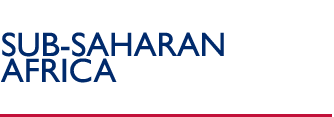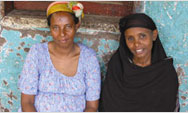Angola
USAID's Strategy in Angola
Angola’s low level of human development is at odds with its
potential for economic prosperity, evident in the country's
wealth of natural resources. Much of this paradoxical situation
is explained by the social disruption and physical destruction
generated by nearly 30 years of civil war. Angola is continuing
the transition toward national reconciliation and peace that
was begun in earnest in 2002. As a potential powerhouse for
regional trade and investment— Angola is sub-Saharan Africa's
second largest oil producer—the country has the potential
to make an important contribution to regional growth and stability.
To help the country realize its potential, USAID focuses on
food security, democratic governance, improved maternal/child
health, and economic reform.
INCREASING FOOD SECURITY
Formerly an exporter of grains and other foods, Angola today
imports about half of its food requirements, even though 65
percent or more of the work force is engaged in agriculture
and Angola has rich natural resources to support a vibrant agriculture
sector. USAID uses two approaches to ensure the people of Angola
get enough to eat. The first approach provides vulnerable households
with essential recovery assistance such as direct food aid,
food for work, tools, seeds and other key inputs to 2.2 million
people in 2005. The second approach complements those contributions
with interventions designed to increase agricultural productivity
by facilitating better access to credit, agricultural inputs
such as seed and fertilizer, relevant market information, and
environmentally-friendly agricultural practices. As a result,
farmer producers marketed 16,790 metric tons of vegetables,
worth over $6 million.
STRENGTHENING DEMOCRATIC GOVERNANCE
The legacy of war and the concentration of political and economic power in the hands of state elites serve to exclude the majority of citizens from public life. National elections have been repeatedly delayed; legislative elections are now expected in 2006 and presidential elections in 2007. USAID promotes civil society coalitions, an independent media, and the groundwork for free and fair elections. USAID activities improve public access to policy-oriented information, increasing citizens’ knowledge and ability to advocate for their concerns through more than 1,300 news articles and radio broadcasts reaching 2.3 million people. New conflict transition initiatives provide training in conflict prevention techniques to civil society organizations (CSOs), members of the National Assembly, and local government officials. Electoral support programs strengthen political parties through training, educational materials about elections, and promoting CSO awareness of their role in promoting a participatory electoral process.
IMPROVING HEALTH FOR MOTHERS AND CHILDREN
Average life expectancy in Angola is 40 years. Only 3 percent
of all communities have a health center. However, restricted
movement during the war years helped stem the spread of HIV/AIDS,
the prevalence rate of which is estimated at 2.8 percent. USAID's
health program focuses on increasing the use of maternal and
child health services and decreasing the spread of HIV/AIDS,
malaria, and other infectious diseases. The program helps the
Angolan Ministry of Health (MOH) to provide quality health care
services. USAID-funded nongovernmental organizations worked
with the MOH to vaccinate 5.5 million children against polio.
The HIV/AIDS program supports information, education, and communication
activities to change behavior; voluntary counseling and testing
centers for HIV/AIDS and other sexually transmitted infections;
and, distribution of HIV/AIDS rapid test kits and condoms.
SUPPORTING ECONOMIC REFORM
Real GDP growth is predicted to reach 11.6 percent in 2005,
due to significant increases in oil revenues, as well as post-war
construction efforts. However, overall economic performance
remains well below potential. USAID's economic growth program
encourages private enterprise as an engine for Angola’s
future development, and promotes increased trade and investment.
In 2004, with USAID support, a newly established commercial
bank, NovoBanco, introduced a new savings account that required
no minimum deposit. This increased credit access through new
loans offered to a market previously neglected. Within one month
of opening, NovoBanco had issued 119 loans to small and medium
enterprises, established an outstanding credit portfolio of
$562,060, and opened 1,919 savings accounts, totaling $460,848
in deposits. USAID supports the Center for Economic Studies
and Scientific Research (CESSR), an independent think-tank affiliated
with a local university, to publish the first readily available
local source of economic data and analysis, fostering informed
public debate on economic policy issues.
Back to Top ^
|


